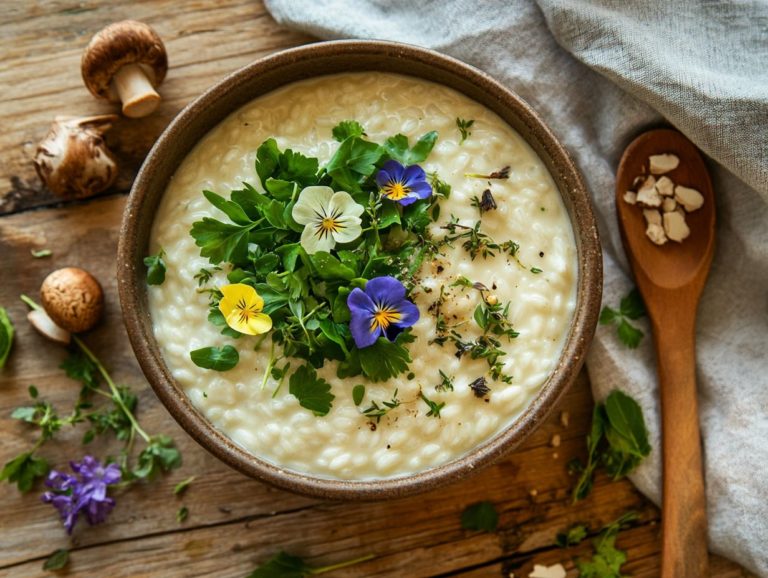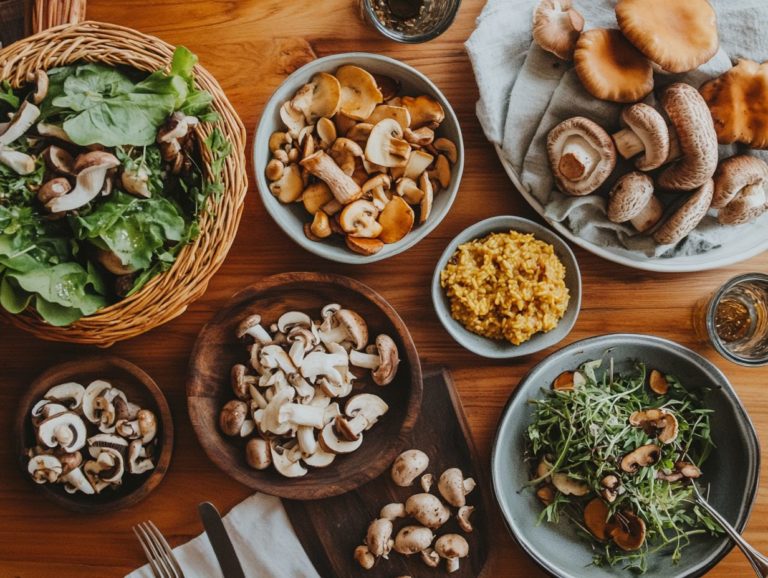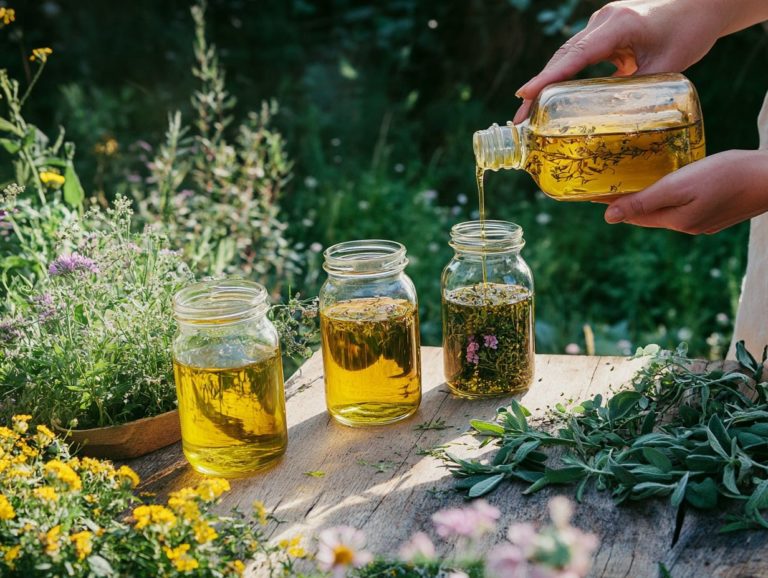Pine Needle Tea: Health Benefits and Recipe
Pine needle tea, a fragrant tea with a rich history, is drawing attention for its impressive health benefits, including high levels of vitamin C, essential for boosting your immune system.
Rooted in diverse cultures, this tea presents a wealth of antioxidant properties, bolsters your immune system, and offers anti-inflammatory effects.
Dive into the captivating cultural significance of pine needle tea, learn a straightforward recipe for crafting your own, and consider the potential risks to keep in mind.
Discover why this woodland brew might be your next favorite drink!
Contents
Key Takeaways:
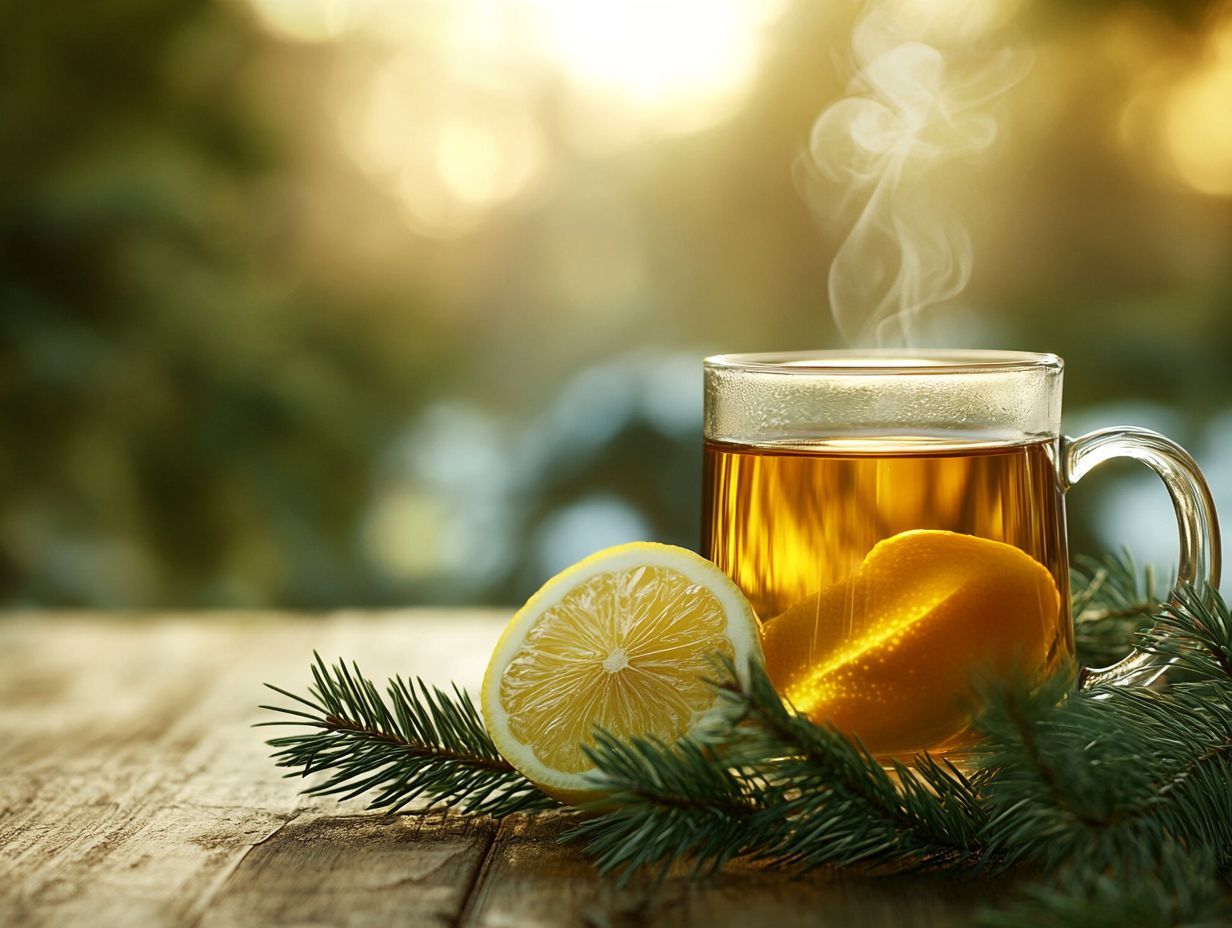
- Pine needle tea has a long history of use in various cultures and is known for its antioxidant, immune-boosting, and anti-inflammatory properties.
- To make pine needle tea, gather fresh or dried pine needles for your infusion and steep them in hot water for 10-15 minutes. Add honey or lemon for added flavor.
- While generally considered safe, individuals with allergies to pine should avoid consuming the tea. It may also interact with certain medications, so consult a doctor before trying it.
What is Pine Needle Tea?
Pine Needle Tea is a rejuvenating herbal infusion crafted from the young needles of different pine species. It’s celebrated for its abundant vitamin C content and calming qualities, cherished across cultures for generations.
This enchanting brew not only warms you up on a chilly winter’s day but also captures the essence of nature with its aromatic fragrance and numerous health benefits that have stood the test of time.
From the serene forests of Dean to your very own kitchen, pine needle tea serves as a delightful homemade remedy for various ailments. It is easily prepared and offers a perfect blend of flavor and nourishment.
History and Cultural Significance
Pine Needle Tea boasts a rich history woven into various cultures, particularly among the Iroquois, who treasured its medicinal properties and incorporated it into their herbal medicine practices for centuries.
This aromatic brew has also nestled itself into the traditions of numerous Indigenous tribes across North America. It was often prepared to tackle ailments like coughs and colds, thanks to the impressive vitamin C content of the needles.
Beyond its health benefits, Pine Needle Tea played a vital social role, enjoyed during communal gatherings that fostered a sense of community and shared heritage.
Historical records show that early European settlers embraced this brew, recognizing its ability to bolster their immune systems during the harsh winters. This remarkable beverage highlights the ingenuity of various civilizations and reflects their profound connection to the forests that offered both sustenance and healing.
Health Benefits of Pine Needle Tea
The health benefits of Pine Needle Tea are extensive, making it a favored option for herbal enthusiasts in search of natural remedies for a range of ailments. This fragrant tea warms the heart and is rich in vitamin C and antioxidants.
Not only does it bolster your immune system, but it also provides relief from respiratory issues like chest congestion.
It is also recognized for its anti-aging effects and anti-inflammatory properties, elevating its status as a soothing beverage that promotes overall wellness.
Grab some pine needles and start brewing today for a health boost!
Antioxidant Properties
Pine Needle Tea is well-known for its impressive antioxidant content. This helps in fighting damage from free radicals and enhancing your overall health.
These powerful antioxidants, including natural compounds in plants and vitamin C, work hard to neutralize free radicals in your body. This may lower the risk of chronic diseases and boost your immune function. By regularly incorporating this herbal beverage into your diet, you might notice improved skin elasticity and a more youthful glow, thanks to the tea’s remarkable anti-aging properties. Antioxidants can also help reduce inflammation, contributing to a vibrant complexion and a sense of overall vitality.
If you re eager to enjoy the rejuvenating effects of nature, sipping on Pine Needle Tea can be a simple yet impactful addition to your wellness routine!
Immune System Boost
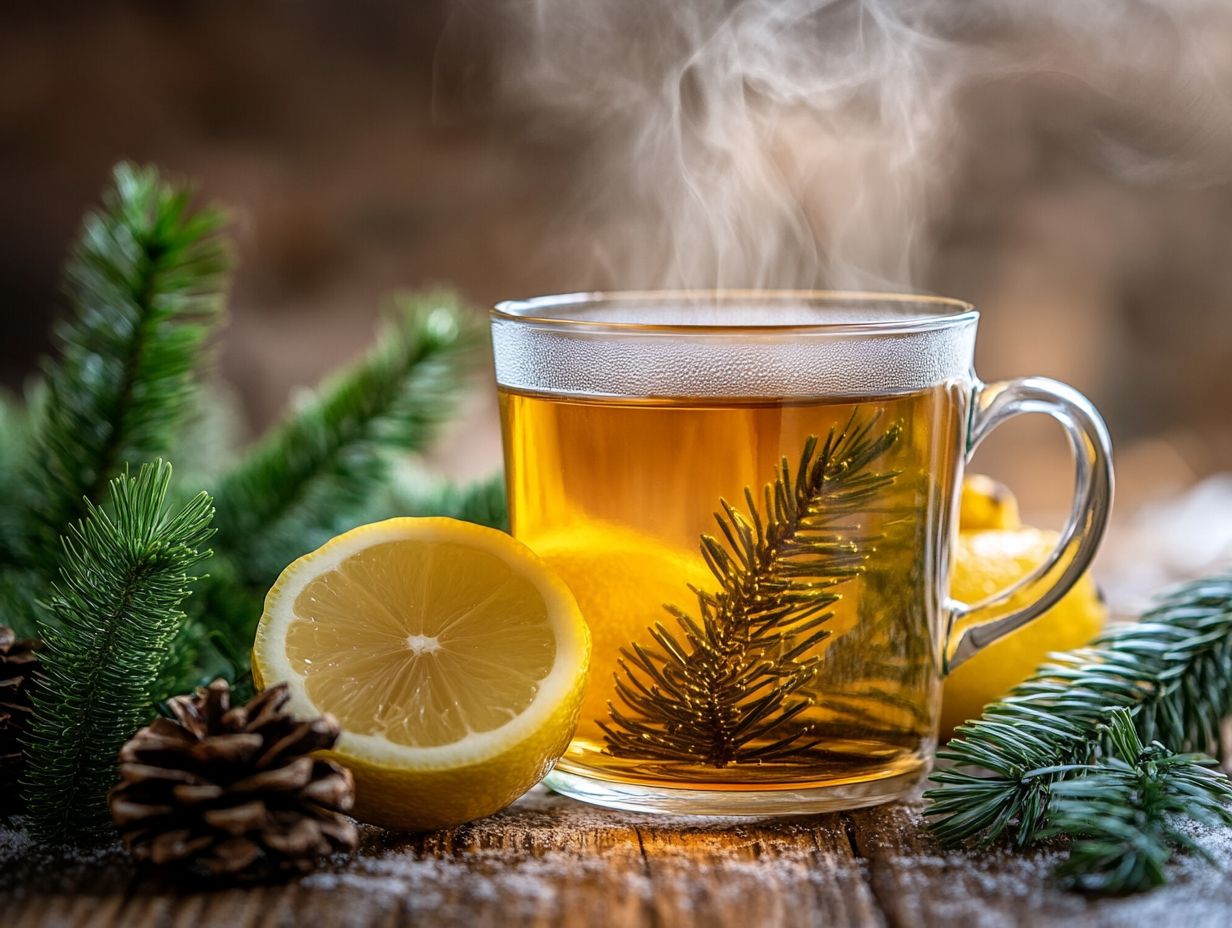
One standout benefit of Pine Needle Tea is its ability to strengthen your immune system, mainly due to its high vitamin C content.
This essential vitamin is crucial for boosting the production of white blood cells, the body’s defenders against infections. The tea s antioxidants work hard to combat oxidative stress, which further improves your overall health and immunity.
Natural compounds like natural compounds in plants help reduce inflammation and improve cellular function.
Are you looking for a natural remedy to alleviate cold and flu symptoms? Incorporating Pine Needle Tea into your daily routine could be a game-changer! It not only supports your immune health but also enhances your overall well-being.
Anti-inflammatory Effects
Pine Needle Tea is famous for its remarkable anti-inflammatory properties, making it a powerful natural remedy.
This is especially beneficial for those dealing with conditions like arthritis, where inflammation can worsen pain and discomfort. By sipping on this tea, you may find relief as it helps reduce swelling and improve joint mobility.
Its abundant antioxidants work tirelessly to combat oxidative stress, often linked to chronic inflammation. With regular consumption, you might notice fewer inflammation-related symptoms, which fosters improved respiratory health and bolsters your immune function. This can lead to a more balanced and healthier lifestyle.
Pine Needle Tea Recipe
Making your own Pine Needle Tea is not only delightful but also allows you to customize it to your taste. It s an easy Pine Needle Tea recipe that’s simple to adjust!
You can experiment with various ingredients, including fresh pine needles, ginger slices for a zesty kick, and spices that blend beautifully for a truly exquisite brew. This flavorful seasonal beverage is easy to make and warms both heart and soul during the winter months.
Ingredients and Preparation
To prepare Pine Needle Tea, gather:
- Fresh pine needles, spruce branches, or Douglas Fir shoots
- Optional: ginger and honey syrup for sweetness
Start by selecting healthy, vibrant green needles from trees that are free of pesticides and herbicides. The younger, tender needles are usually the most nutritious and flavorful. After your foraging, rinse the needles thoroughly to remove any dirt. Then chop them into smaller pieces to enhance their flavor while brewing.
In a pot, combine the chopped needles with freshly boiled water and let it steep for about 15 to 20 minutes. Feeling adventurous? Toss in some ginger slices for extra spice or drizzle in honey syrup for a touch of sweetness. This creates a soothing and aromatic blend that s perfect for any occasion!
Tips and Variations
Enhancing your Pine Needle Tea experience can be an art form, with various tips and variations that elevate its flavor profile.
One effective approach is to introduce mulling spices, such as cinnamon or cloves, which add a delightful warmth and depth to your brew. Complementary ingredients like honey or lemon can harmonize beautifully, balancing the pine’s distinct aroma with just the right touch of sweetness or acidity.
For the best flavor, use fresh needles. Steep them gently for about 5 to 10 minutes. This ensures your tea is both aromatic and invigorating. By experimenting with these elements, you can create a uniquely tailored brew that satisfies your palate and preserves the health benefits of this delightful infusion.
Potential Risks and Considerations
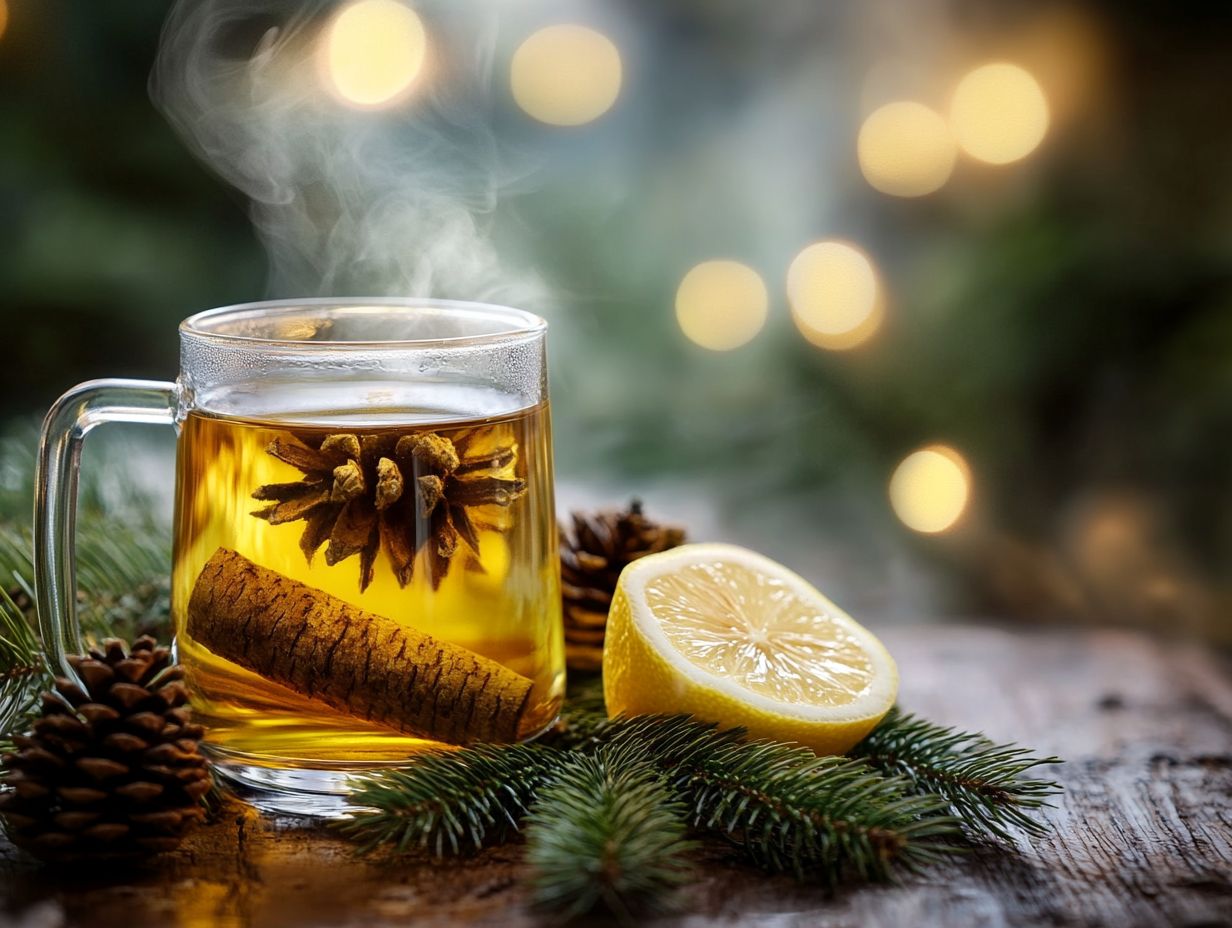
Pine Needle Tea is indeed lauded for its numerous health benefits, but it’s vital to be aware of the potential risks and considerations linked to its consumption.
Some individuals might experience side effects or allergic reactions, especially if they have sensitivities to elements within the pine family.
Additionally, there could be interactions with certain medications, making it all the more important to check with your healthcare provider before introducing this delightful herbal tea into your routine.
Side Effects and Allergies
Pine Needle Tea may produce side effects for some individuals, especially those with allergies to plants in the pine family.
For example, allergic reactions can show up in various forms, like skin rashes, itching, or respiratory issues, including wheezing or difficulty breathing. If you re sensitive to certain plant compounds, it s essential to approach this tea with caution. While anaphylaxis a severe allergic reaction is rare, it s still a serious concern.
Certain pine needle varieties also contain high levels of vitamin A, which can lead to toxicity if consumed in excess. This presents risks such as liver damage or headaches.
As with any herbal remedy, be sure to check with your healthcare provider if you have underlying health conditions or concerns about potential adverse effects.
Interactions with Medications
It s essential to recognize that Pine Needle Tea might interact with certain medications, so exercise caution if you re undergoing treatment.
This herbal infusion contains compounds that could potentially influence the effectiveness of various drugs, particularly anticoagulants, antiplatelet medications, and certain types of antidepressants. If you re using medications like warfarin or aspirin, be especially careful, as the natural properties of the tea might alter the expected outcomes of your treatments.
For those taking medications that affect blood pressure or blood sugar levels, it s wise to consult with healthcare professionals to avoid any adverse reactions. Speaking with a doctor or a qualified herbalist can offer clarity and help ensure that the benefits of Pine Needle Tea are seamlessly and safely incorporated into your health regimen.
Frequently Asked Questions
What are the health benefits of drinking Pine Needle Tea?
Pine Needle Tea contains high levels of antioxidants and vitamin C, which can boost your immune system and improve overall health. It also has anti-inflammatory properties and can aid in digestion.
Can Pine Needle Tea help with respiratory issues?
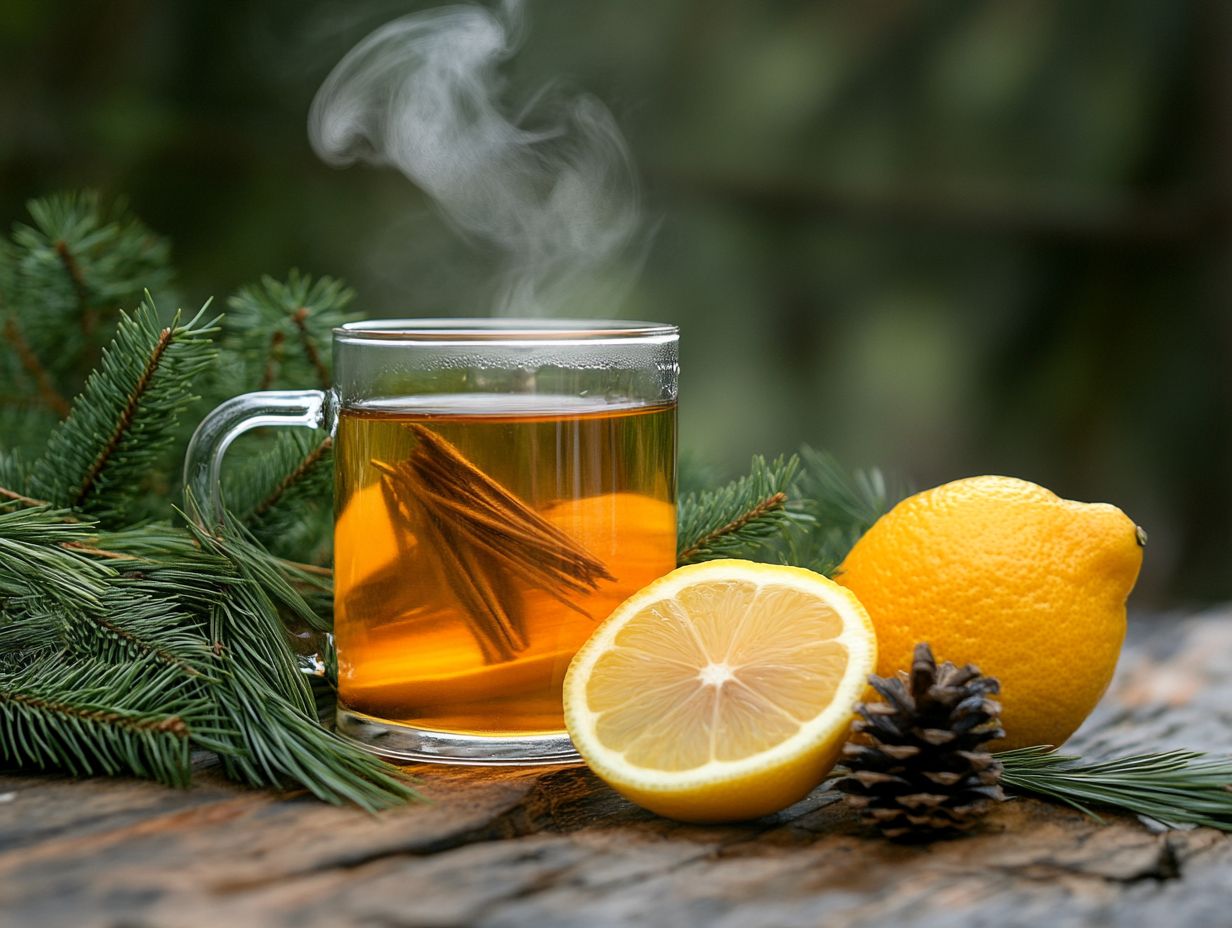
Yes, Pine Needle Tea has been used for centuries to treat respiratory ailments such as coughs and congestion. Its natural expectorant properties can help loosen mucus and alleviate symptoms.
How can I make Pine Needle Tea at home?
To make Pine Needle Tea, simply boil 1-2 cups of water and add a handful of fresh pine needles. Let it simmer for about 10 minutes, strain the tea, and enjoy! You can also add honey or lemon for added flavor.
Experience the wonderful benefits and refreshing taste of Pine Needle Tea your taste buds will thank you!
Is Pine Needle Tea safe for everyone to drink?
Pine Needle Tea is generally safe for most people. However, consult your doctor before trying it if you’re pregnant, breastfeeding, or have existing health issues.
Are there any potential side effects of drinking Pine Needle Tea?
Some may experience mild side effects, like an upset stomach or headaches. If you notice any adverse reactions, stop drinking the tea and talk to your doctor right away.
Can Pine Needle Tea treat or prevent certain diseases?
Pine Needle Tea isn’t a cure for specific diseases. It can support overall health and may help prevent certain conditions due to its high levels of antioxidants, which help protect your cells.
Always seek proper medical treatment from your doctor.


